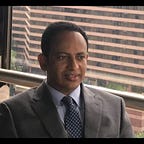Presenting Only One Side of the Story on the Pages of the New York Times Harms the Cause of Truth and Peace in Ethiopia
The following op-ed piece was submitted to the New York Times in response to Nicholas Kristof’s column dated April 24, 2021. After a number of attempts to publish it in the New York Times consistent with previous unsuccessful attempts to respond to reports and opinions in the New York Times, I’ve decided to publish it on Medium.com.
In his April 24 column, New York Times Op-Ed Columnist, Nicholas Kristof, lamented the fate of Dr. Tedros Adhanom, Director General of the World Health Organization (WHO) as “one of the world’s most recognized public servants” who “may have become a refugee” as a result of the crisis in Tigray region of Ethiopia.
Regrettably, Kristof appears to be driven by sentiment more than facts, or perhaps willful ignorance of the circumstances precipitating the Tigray crisis.
On November 3, 2020, the Tigray People’s Liberation Front (TPLF), of which Dr. Tedros was a high-ranking member before his appointment to the WHO, launched a surprise military attack on the Ethiopian National Defense Forces in the Tigray region. That attack resulted in the massacre, maiming, torture, and detention of tens of thousands of Ethiopian federal troops.
Top TPLF leader, Sekou Toure Getachew, said the aim of the attack was to conduct a “blitzkrieg” assault on Ethiopian federal forces and swiftly capture the major cities in the country.
On November 4, 2020, U.S. Secretary of State Mike Pompeo issued a statement expressing “deep concern the Tigray People’s Liberation Front carried out attacks on Ethiopian National Defense Force bases in Ethiopia’s Tigray region.”
On November 15, 2020, U.S. Assistant Secretary for African Affairs Tibor Nagy tweeted, “strongly condemning the TPLF’s unjustifiable attacks against Eritrea” and its “efforts to internationalize the conflict in Tigray.”
On December 1, 2020, Nagy gave an interview to the BBC and explained the “Tigrean leadership wanted to use the opportunity basically to overthrow the prime minister and return to the type of privilege that they had enjoyed within the Ethiopian state for the last 27 years.”
The actions taken by the Ethiopian federal government following the attack are no different than what any other country would have taken under the circumstances.
Indeed, the African Union supported the Ethiopian Government’s law enforcement action to protect its territorial and political integrity.
The TPLF is entirely responsible for the onset and consequences of the Tigray conflict. Kristof’s attempts to portray Dr. Tedros as an innocent victim of circumstances are misleading and disingenuous.
Dr. Tedros’ ascribed status of “refugee” appears to be intended to generate sympathy for him as a victim of government persecution. Undoubtedly, he is free to return to Ethiopia at any time. It would be tabloid journalism to classify him as a “refugee” unable to contact family and friends in Tigray.
Dr. Tedros, just like many diaspora Ethiopians with family members in the Tigray region, can place a telephone call to his relatives and friends. It is true that the TPLF has destroyed communication infrastructures in the Tigray region. Today, telephone and internet services have been restored in many parts of Tigray.
In the unlikely event Dr. Tedros is unable to reach his relatives directly, he can easily use the hotline set up by the Tigray provisional administration and establish contact with anyone he pleases.
Kristoff makes no mention of the fact that in the months following the TPLF attack, the Ethiopian federal government embarked on a major reconstruction effort in Tigray. Today, the Provisional Administration in Tigray has reactivated the civil service and works cooperatively with community elders and faith leaders. The roads, bridges, airports, schools, hospitals, and other infrastructure in the Tigray region are undergoing reconstruction.
Moreover, for several months, the region has been open to international journalists and humanitarian workers. International relief organizations like the World Food Programme (WFP) and USAID have played a critical role in responding to the humanitarian needs in the region. However, the Ethiopian Government has provided over 70 percent of all relief aid to the region. In light of the burgeoning needs, the international community needs to step up its assistance to help the people in need.
The UNCHR and the Ethiopian Human Rights Commission have agreed to undertake a joint investigation of human rights violations in the Tigray region. The rule of law reigns in Ethiopia. Individuals suspected or implicated in the planning, financing, and execution of the November 2020 armed insurrection will be held accountable under the law. So will any individuals suspected of human rights violations.
Kristof could have contributed to a constructive discussion of the crisis in the Tigray region by focusing on the critical humanitarian needs of the region and taking a balanced approach to the crisis. By blindly championing Dr. Tedros’s alleged personal plight as a “refugee”, Kristoff diverts international attention from the challenges facing the people of the region. One should not overlook the forest for the tree.
On the other hand, Dr. Tedros can lend extraordinary support to the region using the vast resources available in his organization. His apparent lack of interest to work directly with the Government in Ethiopia to meet the critical humanitarian needs in the Tigray region diminishes his credibility. The door remains open to Dr. Tedros to “come in from the cold” and become part of the solution to alleviate the humanitarian crisis in the Tigray region. The politics of recrimination and finger-pointing will not advance the cause of helping our citizens most in need.
One is entitled to one’s (informed) opinion but an opinion based on pathos alone inevitably misinform if not disinform.
